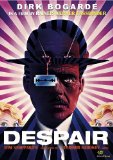| Reviews & Columns |
|
Reviews DVD TV on DVD Blu-ray 4K UHD International DVDs In Theaters Reviews by Studio Video Games Features Collector Series DVDs Easter Egg Database Interviews DVD Talk Radio Feature Articles Columns Anime Talk DVD Savant Horror DVDs The M.O.D. Squad Art House HD Talk Silent DVD
|
DVD Talk Forum |
|
|
| Resources |
|
DVD Price Search Customer Service #'s RCE Info Links |
|
Columns
|
|
|
Despair
THE MOVIE:
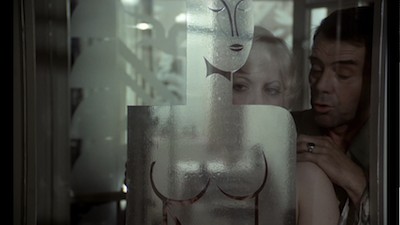
Set in Germany just after the U.S. stock market crash that caused the Great Depression, Despair is the story of one Hermann Hermann (Dirk Bogarde), a Russian immigrant who runs a candy factory where his workers dress all in purple. Yeah, big purple jumpsuits, and there is purple on the walls, too. It's an odd detail in a movie full of odd details, like Willy Wonka made one pass with a paintbrush and then kept going. Whether this is an intended visual echo on the part of director Rainer Werner Fassbinder, I can't say, but it wouldn't be out of place in Despair, a film full of allusions to and illusions of doppelgangers and mirror images, some cinematic, some altogether their own concoction.
The first double-up, of course, is that name: Hermann Hermann. The redundancy is only addressed once, and Hermann asks what it matters which of his names is which, how are they different? The candymaker is prone to dissociative fantasies, imagining a second version of himself sitting and watching him have sex with his wife Lydia or even vice versa--the real deal watching the imaginary twin indulging in his more questionable fantasies. Fitting that a movie set in the era when Hitler was coming to power would have the star of The Night Porter imagining himself as an s&m Nazi. It's also fitting that a chocolatier would enjoy having a plump wife (played by a gung-ho Andréa Ferréol) and praise her for being so, even as he admonishes her for her stupidity. (She thinks Wall Street collapsed for real; like, the whole street physically fell apart.) He indulges her appetites, including turning a blind eye to her affair with her "cousin," a Bohemian painter named Ardalion (Volker Spangler). These two men serve as opposites: Ardalion is corpulent and lazy and free in an obnoxious and contrived way, while Hermann Hermann is lithe, buttoned-up, and driven.
As Despair progresses, Hermann becomes more obsessed with the notion of his own double. On a trip to Vienna, he meets a homeless man named Felix (Klaus Löwitsch) that Hermann becomes convinced looks exactly like him. The rich man impresses himself on the wanderer, and he concocts a scheme to use the wayward soul to trade places with his own wayward soul. The latter half of the movie sees Hermann on the run wearing Felix's brown leather jacket, unkempt and unshaven, looking like Humphrey Bogart in Desperate Hours. I'm tempted to say that things get weird from there, but the whole movie is weird in a very intriguing way, playing with our perception of what is happening and challenging our acceptance of the believability of moving images. Hermann takes his wife and her lover to see a silent movie featuring one actor playing twins on two separate but interlinked paths. One is a crook on the lam, the other the cop hunting him. Ardalion keeps pointing out the line down the center of the screen that shows where the filmmakers spliced two images of the same performer together, while Lydia can't see it at all. Later, Hermann thinks he sees the actor from the film working at his factory, and then even pretends to be him, building to a conclusion lifted straight out of Sunset Boulevard.
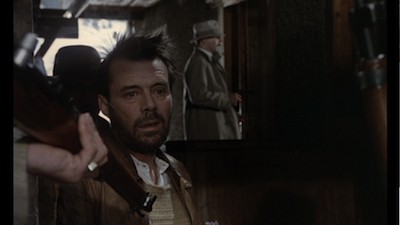
Released in 1978, Despair is based on a book by Vladimir Nabokov, and the screenplay was adapted by playwright Tom Stoppard. Thematically, these riddles within riddles are right up Stoppard's alley. He explored duality and perception in many of his early plays, including Rosencrantz and Guildenstern are Dead and The Real Inspector Hound, and even in later efforts like his screenplay for Shakespeare in Love. He is a writer perfectly suited to Nabokov's satirical undertones. The debates about politics, Hermann's admonishments of Lydia, and Felix's statements about philosophy and class all subtly critique societal constructs, while also being very funny. Both writers have a love of language, and their combined efforts really shine here.
The pedigree of Despair is pretty impressive overall. Fassbinder's team included Michael Balhaus, who would become Scorsese's preferred cinematographer, and composer Peer Raben. Both men lend their skills to creating the hallucinatory atmosphere of Despair. The camera goes on dizzying tours of the individual scenes, moving in and out and around, as Fassbinder stages long, choreographed takes. Raben underscores this with music that flows from more typical orchestral pieces to bizarre synthesized sounds, anachronistically disorienting the viewer alongside Hermann. Despair can be a trippy film, one that regularly leaves the viewer guessing, pulling many a rug out from under us before revealing the firm ground that lies beneath.
When I was considering taking Despair for review, I commented to one of my colleagues that I find Dirk Bogarde creepy, a misconception I have to say is entirely based on his panting performance in the aforementioned Night Porter. Having recently seen his impressive dramatic turn in Basil Dearden's Victim and his terrible yet decidedly not-creepy take on James Bond-villainy in Joseph Losey's truly awful adaptation of Modesty Blaise, I have to face facts and admit I wasn't giving him enough credit by pigeonholing him this way. He's incredible in Despair, alternately charming, laughable, and...well, a little creepy. He overplays the character's assumed airs, exaggerating Hermann's gesture and accent at times, almost as if he is parodying James Mason's portrayal of another double-named Nabokov protagonist, Humbert Humbert, in Kubrick's Lolita. Both characters are self-important blowhards, but unlike Humbert, Hermann seems to be aware of his own puffery.
Ultimately, Despair is less about the sadness the title brings to mind and more about one man's obsessive exploration of his own dual nature--or perhaps just of how he perceives it to be. Hermann Hermann is a man without a country, living with an invented past, and who sets about trying to invent an alternate future. Fassbinder's movie is tricky and disconcerting, but also funny and impressively strange. It's also totally unpredictable, keeping the audience blissfully unaware of each and every oncoming swerve.
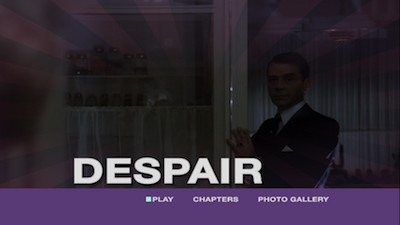
THE DVD
Video:
Olive Films continues to build a reputation for bringing neglected films to DVD in impressive restored packages with their release of Despair. The 1.66:1 anamorphic widescreen transfer looks fantastic, with rich colors and a fine surface grain that captures the aesthetic quality of1970s film stock. The picture is crisp and clear and almost entirely free of scratches or other debris. Dark and light are balanced well, with excellent blacks and also sparkling brightness in some of the more abstract, nightmarish scenes.
Sound:
The original English soundtrack is mixed as a standard stereo 2.0 track, and it sounds pretty good. Sometimes when it gets loud, it can be a little tinny, but that's also often when the music is cranking, and it might just be a product of the cinematic mechanics at the time of production. Dialogue is easy to hear and has good nuance.
Extras:
A brief photo gallery of stills from the movie.
FINAL THOUGHTS:
Highly Recommended. Despair is a weird film, full of delusory camera tricks and desultory narrative switch-ups. A trip from start to finish, it details one man's obsession with his own dual nature. Starring Dirk Bogarde, and working from a script by Tom Stoppard and a novel by Vladimir Nabokov, German filmmaker Rainer Werner Fassbinder creates a genuinely surreal 1970s narrative, spinning a peculiar cinematic prism to bifurcate history both real and fictional. It's full of wonky surprises, and adds up to one big wonky surprise all on its own. It's not depressing either. Don't be fooled by the title, there is no truth in this advertising. Despair will light up your synapses, not dull them.
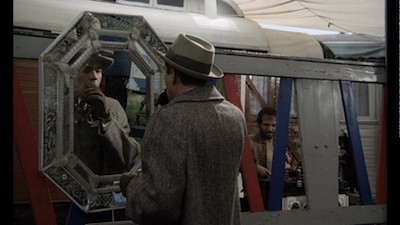
Jamie S. Rich is a novelist and comic book writer. He is best known for his collaborations with Joelle Jones, including the hardboiled crime comic book You Have Killed Me, the challenging romance 12 Reasons Why I Love Her, and the 2007 prose novel Have You Seen the Horizon Lately?, for which Jones did the cover. All three were published by Oni Press. His most recent projects include the futuristic romance A Boy and a Girl with Natalie Nourigat; Archer Coe and the Thousand Natural Shocks, a loopy crime tale drawn by Dan Christensen; and the horror miniseries Madame Frankenstein, a collaboration with Megan Levens. Follow Rich's blog at Confessions123.com.
|
| Popular Reviews |
| Sponsored Links |
|
|
| Sponsored Links |
|
|
| Release List | Reviews | Shop | Newsletter | Forum | DVD Giveaways | Blu-Ray | Advertise |
|
Copyright 2024 DVDTalk.com All Rights Reserved. Legal Info, Privacy Policy, Terms of Use,
Manage Preferences,
Your Privacy Choices | |||||||









